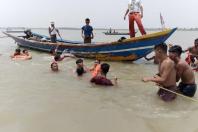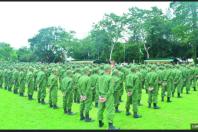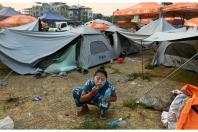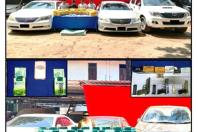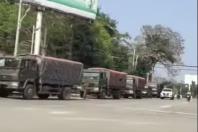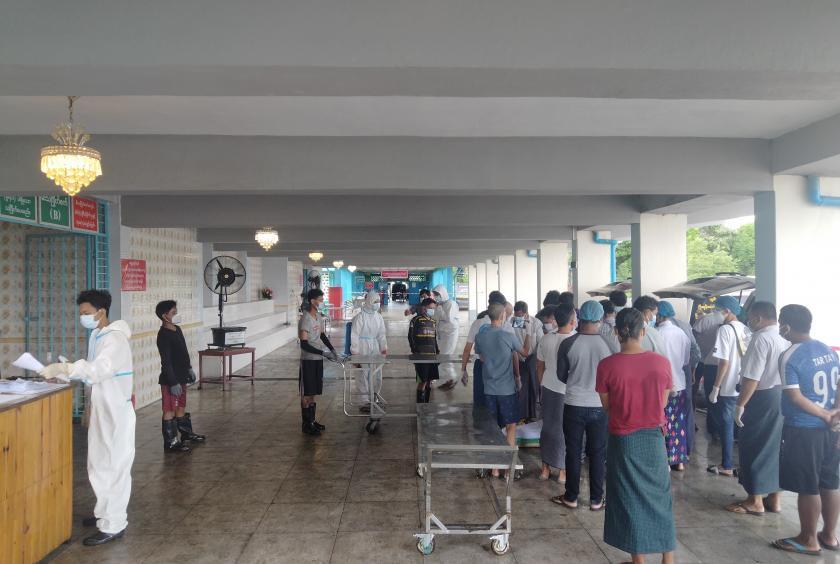
"We have to transport around 20 to 30 bodies per day. Some days, we cannot even get them all," said Ko Min Din from the Myittar Thingaha charity/civil society.
According to him, the great amount of deaths during the third wave of Covid-19 means that groups like Myittar Thingaha are busier than ever.
"There are no rest days. We pick up the body, get the death certificate and send it to the cemetery. We wait and when it is our turn, we give it to the cemetery and we leave," said Ko Min Din.
The amount of cases mean that such groups also have to cooperate amongst each other.
"Even if we are seeing less work, other groups will ask for help. We have to be in contact with at least one other group because let's say if we are picking up two or three bodies in East Dagon, we have to ask others for help. The help goes both ways," said Ko Min Din.
India and Indonesia
Myanmar's neighbour India is also seeing a skyrocketing amount of Covid-19 cases.
According to a report from the VOA, places across India are now opting to bury the dead in mass graves alongside the river or even carry out mass cremations at parking lots as India sees around 750 thousand deaths so far.
"I've been here since 7am. There are at least 15 ambulances that are carrying two or three bodies each. The eight ambulances over there have been waiting since the morning," quoted the VOA article.
It is a similar situation in Indonesia, an Asean member nation.
BBC reports that firefighters now have to carry those that died at home, most of them people that live by themselves, from a lack of oxygen.
BBC says that while such cases were limited to two or three bodies, there are now at least 20 such incidents since Indonesia started seeing a rising amount of Covid-19 cases in July.
(Photo - Crematorium in Yayway)
Third wave
The third wave of Covid-19 is undoubtedly much more brutal than the second one.
The Ministry of Health and Sports (MOHS) had reported its finding of deadlier Covid-19 variants, specifically Alpha, delta and Kappa, in Myanmar since the middle of May.
The MOHS had also warned that the variants were found to be much more infectious with one infected in a family could result in positivity for the rest of the family members.
Since then, the MOHS's daily reports show that starting from July, the number of new cases per day as well as deaths have only grown larger and regularly breaking previous records.
Lack of oxygen
The disparity between the supply and demand of oxygen is extremely apparent.
Kale was one of the earliest examples within Myanmar.
Volunteer and civil organisations report that there are almost no streets without at least one funeral on them.
Oxygen cylinders and other equipment were ordered from places such as Yangon, Mandalay and Monywa initially. Later, Kale locals managed to pool together funds to set up an oxygen factory.
The factory, despite being able to pump out on a daily basis 78 units of 40 litre cylinders, started its operation on July 9 but had yet to be able to solve the demand in Kale.
Similarly, Yangon also started seeing the crippling demand for oxygen.
Many groups that had previously existed that either sells or donates oxygen to those that needed it could simply no longer keep up.
Factories within industrial zones such as those in South Dagon or Shwepyithar also cannot fulfil the overwhelming demand.
"I've been waiting since morning. The 40 liter cylinders cannot be refilled anymore and only the 10 and 15 liter ones will be refilled. They say 40 liter refills can only resume tomorrow and for now, I will have to take whatever I can get," said a person queuing up in front of an oxygen factory in South Dagon industrial zone.
Death from lack of oxygen
According to the WHO, around 80 percent of Covid-19 positive patients will suffer from mild symptoms with most of them not even displaying the telltale signs. However, around 15 percent of them will require oxygen support and the other 5 percent will need to be attached to ventilators.
Volunteer, charity and civil groups within Yangon say that the demand for more oxygen and deaths as a result of not having access to oxygen are only climbing in numbers.
"There are many times where we take the patient in the car and have to go around town to look for oxygen," said a volunteer.
The MOHS's reports state that there were 1012 deaths from July 1 to 15 from Covid-19. This is a tremendous spike compared to the beginning of July where only tens were dying. By July 13, over 100 were dying each day.
According to volunteer workers, the actual numbers on ground could be much higher.
"Yesterday, a father and son were both found dead at home. We were called up and informed by the sister of the son. According to her, it is definitely Covid," said Ko Min Din.
The sister in question lost contact with both and upon arrival at their home, found both her brother and father dead.
"There were no injuries. The son died sitting on the chair and the father had passed away on the bed," said Ko Min Din.
Cemeteries are also now flooded with bodies and despite continuous work from the crematorium staff, bodies line up the hallways in the hundreds, waiting to be cremated.
"For today (July 17), we have to keep the body in the car. If it's our turn, we reverse the car in, remove the body onto a shelf. So it doesn't look too ugly but there is a long line of vehicles now," said Ko Min Din.
He also speaks of difficulty in obtaining documentation and due process for the corpses.
"The authorization for the cemetery can only be obtained around 10am for us. We cannot go to the cemetery without it because the cemetery will only accept the body with that ticket. So by the time we get to the cemetery for the first time in the day, it is already past 12 noon. There are at least 50 cars ahead of us already," said an in-charge from another charity organisation.
Ko Min Din also warns of the danger of more infections at the cemetery itself.
"Some of the family members want to send the dead off. They are not wearing PPEs or other equipment like us. They will be easily infected. And instead of cremation, they should consider burying the dead. Right now, crematorium staff have to pile up bodies and then cremate two to three bodies at a time. The staff are also at risk of being infected. It will be better if the bodies are buried," said Ko Min Din.
As of this moment, there is no way to ascertain that those dead bodies arriving at cemeteries across Yangon are from Covid-19 as most groups helping transport the bodies are not able to conduct tests. However, what is for certain is that the deaths are happening, as proven by scores of volunteer workers scrambling around town to pick up dead bodies from homes.
The sights and sounds of a busy city that is Yangon had all but disappeared, replaced by the blaring sirens of ambulances and vehicles belonging to such groups all over town. Shopping malls, parks and other popular spots remain empty while cemeteries are seeing a sudden influx of overcrowding of the deceased.



